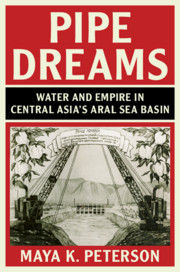Crossref Citations
This Book has been
cited by the following publications. This list is generated based on data provided by Crossref.
Hofman, Irna
Visser, Oane
and
Kalinovsky, Artemy
2020.
Introduction: Encounters After the Soviet Collapse: The Contemporary Chinese Presence in the Former Soviet Union Border Zone.
Problems of Post-Communism,
Vol. 67,
Issue. 3,
p.
193.
Penati, Beatrice
2020.
Imperial desert dreams: cotton growing and irrigation in Central Asia, 1860–1991.
Central Asian Survey,
Vol. 39,
Issue. 1,
p.
161.
Kassymbekova, Botakoz
and
Chokobaeva, Aminat
2021.
On writing Soviet History of Central Asia: frameworks, challenges, prospects.
Central Asian Survey,
Vol. 40,
Issue. 4,
p.
483.
Hofman, Irna
2021.
Migration, crop diversification, and adverse incorporation: understanding the repertoire of contention in rural Tajikistan.
Canadian Journal of Development Studies / Revue canadienne d'études du développement,
Vol. 42,
Issue. 4,
p.
499.
Chokobaeva, Aminat
and
Akulov, Mikhail
2021.
‘Savages’ and ‘exploiters’: Exploring anti‐colonial violence in the time of war and revolution.
Studies in Ethnicity and Nationalism,
Vol. 21,
Issue. 3,
p.
240.
Féaux de la Croix, Jeanne
Arzhantseva, Irina
Dağyeli, Jeanine
Dubuisson, Eva-Marie
Härke, Heinrich
Penati, Beatrice
Ueda, Akira
and
Wooden, Amanda
2022.
Roundtable studying the Anthropocene in Central Asia: the challenge of sources and scales in human–environment relations.
Central Asian Survey,
Vol. 41,
Issue. 1,
p.
180.
Diener, Samuel
2022.
9New Materialisms.
The Year's Work in Critical and Cultural Theory,
Vol. 30,
Issue. 1,
p.
145.
Makhmudov, Oybek
2022.
‘To firmly establish our border at the foot of The Hindu Kush’: road construction as a means of legitimizing the rule of the Russian Empire in the Pamir.
Central Asian Survey,
Vol. 41,
Issue. 2,
p.
244.
Assubayeva, Aliya
Xenarios, Stefanos
Li, Albina
and
Fazli, Siamac
2022.
Assessing water security in Central Asia through a Delphi method and a clustering analysis.
Frontiers in Environmental Science,
Vol. 10,
Issue. ,
Arielli, Nir
2022.
Land, water and the changing Dead Sea environment: A microhistory of Kibbutz Ein Gedi.
Journal of Israeli History,
Vol. 40,
Issue. 2,
p.
235.
Roberts, Flora J
2022.
Rival Eco-Anxieties: Legacy of Soviet Water Management in the Syr Darya Basin.
Security and Human Rights,
Vol. 32,
Issue. 1-4,
p.
41.
Browne, Kim
and
Raff, Murray
2022.
International Law of Underwater Cultural Heritage.
p.
193.
Zajicek, Taylor C.
2022.
The seismic colony: earthquakes, empire and technology in Russian-ruled Turkestan, 1887–1911.
Central Asian Survey,
Vol. 41,
Issue. 2,
p.
322.
van der Straeten, Jonas
and
Obertreis, Julia
2022.
Technology, temporality, and the study of Central Asia: an introduction.
Central Asian Survey,
Vol. 41,
Issue. 2,
p.
211.
Högselius, Per
2022.
The hidden integration of Central Asia: the making of a region through technical infrastructures.
Central Asian Survey,
Vol. 41,
Issue. 2,
p.
223.
Bolaños, Isacar
2022.
Water, Engineers, and French Environmental Imaginaries of Ottoman Iraq, 1868–1908.
Environmental History,
Vol. 27,
Issue. 4,
p.
772.
Penati, Beatrice
2022.
The Elusive zemskii sbor, or: Taxation without Representation in Russian Turkestan?.
Journal of Central Asian History,
Vol. 1,
Issue. 1,
p.
1.
Alieva, Deniza
Usmonova, Gulnoza
Shadmanov, Shukhrat
and
Aktamov, Sherzod
2023.
Fishery culture, sustainable resources usage and transformations needed for local community development: the case of Aral Sea.
Frontiers in Marine Science,
Vol. 10,
Issue. ,
Mercer, Harriet
and
Simpson, Thomas
2023.
Imperialism, colonialism, and climate change science.
WIREs Climate Change,
Vol. 14,
Issue. 6,
Denning, Andrew
2023.
Unscrambling Africa: From Eurafrican Technopolitics to the Fascist New Order.
The Journal of Modern History,
Vol. 95,
Issue. 3,
p.
627.



